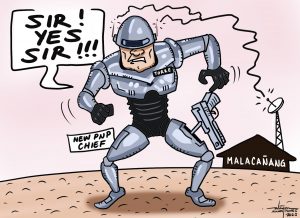In a democracy such as ours, the non sequitur, nay, the ridiculous can become the norm. Take, for instance, the gimmick of many candidates across the country capitalizing on the image of their elders who have held elective positions before them. Or maybe it’s the elders who thought of this as the best stratagem for name recall, a potent way of getting votes.
No wonder that the campaign materials of these neophyte politicians prominently display the familiar faces of their popular kin. Their posters depict them as derivatives of their parents in the political sense of the word. No need for words to convey the message that the passion for public service runs in the blood, that it follows the law of Darwinian evolution. Never mind the quality of governance the forebears have rendered in their time.
Yet, who cares about the inanity of this whole thing? Filipino voters in general are anything but discerning. They would stake the country’s welfare with prominent names, good or bad, with nary a thought on credentials or vision of government. This explains why a candidate in the 2013 midterm elections topped the senatorial race by exploiting her father’s memory as an action star who lost through fraud to Gloria Macapagal-Arroyo, another shrewd politician who rode on her father-president’s good name.
In Bisaya people call it “nagpalaban” (roughly running to another person for help). Among men and boys it is considered a form of cowardice.
However, this is election time; politicians are more than willing to do whatever it takes to win.


